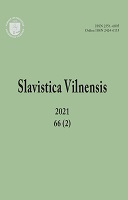Русские и литовские фразеологизмы с компонентом береза / beržas: лингвокультурологический и этнолингвистический аспекты
Russian and Lithuanian Phraseological Units with Component береза / beržas: Linguocultural and Ethnolinguistic Aspects
Author(s): Elena KonitskayaSubject(s): Sociolinguistics, Eastern Slavic Languages, Baltic Languages, Phraseology
Published by: Vilniaus Universiteto Leidykla
Keywords: cultural linguistics; ethnolinguistics; phraseology; Russian language; Lithuanian language; linguistic picture of the world;
Summary/Abstract: The present article deals with the problem of distinguishing between two types of analysis – linguocultural and ethnolinguistic, which can be cleared up by a contrastive study of Russian and Lithuanian phraseological units containing the name of a tree Russ. berjoza ‘birch’ (Lithuan. beržas). This linguocultural analysis emphasized considerable differences in the cultural and symbolic meanings of Russ. berjoza ‘birch’ and Lithuan. beržas. In the Russian linguistic picture of the world, a birch is generally seen as a light, positive tree associated with youth and beauty that is endowed with many positive qualities, while in the Lithuanian linguistic picture of the world, beržas is a useless tree. Еhe opposite features are also noted in both Russian berjoza and Lithuanian beržas. The ethnolinguistic aspect analyzed according to some of the more important parameters showed that the characteristics of the tree reflected in phraseology are often rooted in ancient concepts which are largely common to both peoples. The ethnolinguistic study that referred to the ancient ideas of the two ethnic groups reveals not only their differences, but also their strong similarity (the connection of the tree with the idea of the generations, death, with the chthonic world, and protective functions of a tree, etc.).
Journal: Slavistica Vilnensis
- Issue Year: 66/2021
- Issue No: 2
- Page Range: 93-108
- Page Count: 16
- Language: Russian

